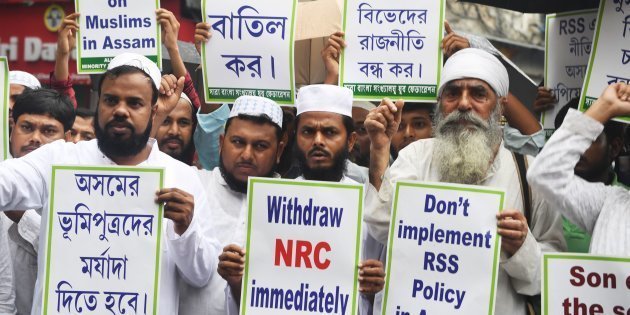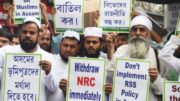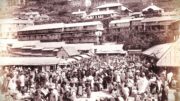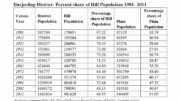Writing is not just a form of divertissement but a healing process that soothes a perturbed and stressful mind, rejuvenates your spirit, and brings you back to life
An atmosphere of dubiety seems to have taken over the hills ever since the announcement that once BJP forms government at the center it will Implement National Register of Citizens (NRC) throughout India. People are muddled about how NRC will affect the Indian Gorkhas in real time. Contrary to the popular belief, NRC will have a definite impact on the Indian Gorkhas unless certain conditions and safeguards are met. Here in this small write up I will try and dissect NRC from a political neutral viewpoint bringing out only those facts that are related to NRC along with its implications on the Indian Gorkhas once implemented.
What is NRC?
The National Register of Citizens is a register containing the names of all the genuine Indian citizens, it was first prepared in 1951 for Assam. NRC draws its power from the Citizenship Act of 1955 and the Rules framed therein. The main objective of preparing the register is to identify illegal immigrants as foreigners and deport them back to their countries.
Issues Related with NRC
(1) The Question of Immunity
After the publication of the first draft of NRC in Assam last year about 40 lakh people were identified as illegal migrants and were excluded from NRC for various reasons, including some 1,50,000 Gorkhas, despite the fact that BJP had promised that Gorkhas living in Assam would not be excluded. Amit Shah recently made a similar promise from Kalimpong that the Gorkhas living in Darjeeling Hills will not be excluded from NRC. With BJPs protracted and strained history of breaking the Gorkhas trust and faith, only time will tell if he is really going to walk the talk this time.
Once excluded from NRC, the person ceases to be a citizen of India. He will no longer be entitled to the rights guaranteed to an Indian Citizen under the constitution and law including the right to vote. The implementation of NRC should not be taken daintily, it is an issue of profound importance with far-reaching consequence as the fate and citizenship rights of lakh of India Gorkhas is at stake here. Immunity, therefore, becomes a matter of paramount concern for all the Indian Gorkhas.
The question now arises as to why about 1,50,000 Indian Gorkhas were excluded from the register in Assam (similar exclusion can happen in Darjeeling) despite the fact that NDA government had assured them that Gorkhas living in Assam will not be touched by NRC. The answer to this question lies in the Citizenship Act of 1955.
It should be noted that NRC draws its power and authority from the Citizenship Act of 1955, therefore, any question of Immunity can only be granted through an act of Parliament by amending the Citizenship Act . Verbal assurances given at the time of the election in the election manifesto, which itself has no legal support is inutile.
The NDA Government had brought a Bill i.e. Citizenship Amendment Bill 2016 which had granted immunity from being declared an illegal immigrant to persons belonging to Hindus, Buddhist, Jains, and Sikhs coming from Bangladesh and Pakistan, however, the said Bill did not mention Indian Gorkhas. To add insult to injury the Bill did not see the light of the day and died its natural death in the Rajya Sabha. For an Ordinary Bill to be passed into a law it has to be passed by both the houses of the parliament with a simple majority. BJP led NDA still does not have the required numbers in the Rajya Sabha. Although it commands an absolute majority in the Lok Sabha it is still a minority in the Rajya Sabha. Rajya Sabha is BJPs Achilles Heel. This is the reason why the names of thousands of Indian Gorkhas living in Assam were struck of the National Register on some flimsy grounds. Despite lofty promises being made the promises were not backed by law. As the commitment lacked legal support it could not be implemented therefore the fate and citizenship rights of thousands of Indian Gorkhas living in Assam still hangs in limbo.
A similar situation is brewing up in Darjeeling, only verbal assurances have been given by the party president. The Bill as it stands today, still does not specifically mention ” Indian Gorkhas”. Even if somehow the party manages to include Indian Gorkhas in the Citizenship Amendment Bill, there is no guarantee that the Bill will pass as BJP is a minority in Rajya Sabha and does not command enough support to pass an Ordinary Bill in one go. Therefore implementing NRC in Darjeeling without specific legal immunity to the INDIAN GORKHAS is suicidal.
(2) Documentation and related matters
It has been found that the names of many persons in Assam were dropped from the draft NRC only because of minor differences in the spellings of Bengali names into English in different documents. Several instances were encountered where a single letter variation, for example, “Omar” and “Onar”, was enough to rule that a person was a foreigner. I now ask how many of us in Darjeeling are not facing similar problems? How many of us have all their and the names of their family members correctly spelled in all their documents? To be honest I don’t. If that be the case my name along with the names of my family members will be struck off the NRC if implemented.
Likewise the rural unlettered are typically vague about their date of birth. A person could be excluded from the register if he/she told the NRC tribunal 40 when the documents recorded to be 42.
Rural uneducated women are especially in danger of exclusion from the citizenship register. Most of them have no birth certificates, are not sent to schools and are married before they become adults, therefore, by the time their names first appear in the voters list these are in a different village where they live after marriage, which is different from those of their parents. They are told by the NRC tribunal that they have no documents to prove that they are indeed the children of the people they claim are their parents. There were cases in ASSAM of being excluded from the citizenship register on this ground alone.
(3) Opaque Process
NRC empowers the Assam police to identify anyone it suspects as foreigners and illegal migrants. How many of us can repose 100% faith and vouch that the police force works with impeccable integrity? If the police are granted such wide powers don’t you think that such power can be abused? Anyone can be picked up by the police on flimsy ground and be declared a foreigner anytime.
The police have also been empowered to refer the cases to a Foreigners Tribunal(FT). It has been alleged that the Tribunals are not presided by judges but by lawyers and in some cases by persons with no legal knowledge, who were appointed by the party.
Moreover, it has also been alleged that the police and the presiding officers in FTs( foreigners tribunal ) work just to fulfill the targets that are set by the party and not to dispense justice.
Not to mention the enormous amount of money one needs to spend fighting these legal cases in the Tribunals proving ones citizenship once declared a foreigner or an illegal migrant under NRC.
(4) The Question of Double Jeopardy
Article 20(2) of the constitution guarantees to every citizen the right not to be prosecuted and punished for the same offense more than once as a fundamental Right. But this principle has been waived off for Foreigners Tribunals(FT). It has been found that even after an FT had confirmed a citizen of India another FT and at times the same FT can again send notice to the same person to prove his citizenship once again. This is a direct violation of Article 20(2) as guaranteed by the constitution of India.
With the entire burden of proving citizenship on one’s shoulders and the arbitrary and opaque multiple forums to which one will be summoned, people deprived of education and resource will be caught in a maze of bureaucratic red tape from which they will find it hard to emerge. There are indeed few parallels in the world where the state itself produces statelessness on the scale and manner that it is doing in Assam and soon in the Hill areas of Darjeeling. Political parties advocating NRC in Darjeeling should exercise caution and do so only after an in-depth analysis of ground realities, after taking into confidence all the stakeholder without which the future and Citizenship Rights of thousands of Indian Gorkhas living in the area could be jeopardized once and for all.

Writes: Phinjo Wangyal Gurung





Be the first to comment on "Understanding NRC: A Politically Neutral Perspective"